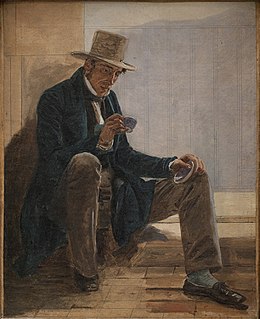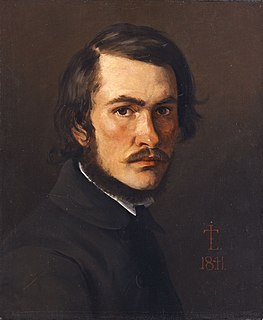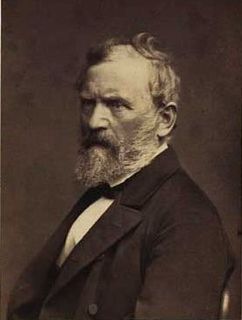
Anders Andersen-Lundby (December 16, 1841 – January 4, 1923) was a Danish landscape painter. He was most associated with winter landscapes. [1] [2]

Anders Andersen-Lundby (December 16, 1841 – January 4, 1923) was a Danish landscape painter. He was most associated with winter landscapes. [1] [2]
Anders Andersen-Lundby was born in Lundby, Denmark. He grew up in Lundby near Aalborg. In 1861, when he was twenty, Andersen-Lundby traveled to Copenhagen, and there he exhibited his works for the first time in 1864. By 1870, he gained popularity especially with his winter landscapes from both Denmark and southern Germany, most often with fallen snow or thaw.
In 1876, he moved to Munich with his family where he exhibited his paintings. He frequently visited Denmark and participated in exhibitions there. He exhibited at the Charlottenborg Spring Exhibition 1864–1913. [3] [4]
In 1865, he married Thora Adelheid Børgesen (1842–1911). He died in Munich in 1923. [4]

Adam Gottlob Oehlenschläger was a Danish poet and playwright. He introduced romanticism into Danish literature. He wrote the lyrics to the song Der er et yndigt land, which is one of the national anthems of Denmark.

Martinus Christian Wesseltoft Rørbye was a Danish painter, known both for genre works and landscapes. He was a central figure of the Golden Age of Danish painting during the first half of the 19th century.

Peter Vilhelm Carl Kyhn was a Danish landscape painter who belonged to the generation of national romantic painters immediately after the Danish Golden Age and before the Modern Breakthrough. Even though he outlived many of his artistic peers by several decades, he remained a traditionalist and expressed strong criticism of many of the new trends in the painting of his day.

Peter Christian Thamsen Skovgaard was a Danish national romantic landscape painter. He is one of the main figures associated with the Golden Age of Danish Painting. He is especially known for his large scale portrayals of the Danish landscape.

Peder Henrik Kristian Zahrtmann, known as Kristian Zahrtmann, was a Danish painter. He was a part of the Danish artistic generation in the late 19th century, along with Peder Severin Krøyer and Theodor Esbern Philipsen, who broke away from both the strictures of traditional Academicism and the heritage of the Golden Age of Danish Painting, in favor of naturalism and realism.

Johan Thomas Lundbye was a Danish painter and graphic artist, known for his animal and landscape paintings. He was inspired by Niels Laurits Høyen's call to develop nationalistic art through depictions of Denmark's characteristic landscapes; the historical buildings and monuments, and the country's simple, rural people. He became one of his generation's national romantic painters, along with P. C. Skovgaard and Lorenz Frølich, to regularly depict the landscape of Zealand.
Lundby and Lundbye are place names and surnames of Scandinavian origin. They may refer to:

The former Diocese of Børglum was a Roman Catholic diocese in Northern Jutland, Denmark. It has also been referred to as the Diocese of Vestervig or the Bishopric of Vendsyssel. The diocese included Vendsyssel, Hanherred, Thy, and Mors.

Christian Henrik Arendrup was Governor-General of the Danish West Indies from 1881 to 1893.
Lundby is an old farming village on the highway between Aalborg and Hadsund, about 12 km southeast of Aalborg. Lundby is included in Gunderup Sogn and Aalborg Municipality. North of Lundby are Lundby Bakker and Krat.

Johan Peter Raadsig was a Danish painter, dealing principally with themes from Danish and Scandinavian history.

Aage Giødesen was a Danish painter who worked in the late 19th and early 20th centuries. He is mainly known for landscapes, as well as for portraits and marine subjects.

Hans Andersen Brendekilde was a Danish painter.

The Nikolaj Contemporary Art Center is an arts centre in Copenhagen which occupies the former St. Nicholas Church, named after Saint Nicholas, one of the city's oldest churches and most conspicuous landmarks. It is situated on Højbro Plads, a few steps away from Amagertorv and Strøget. The church building is noted for its fanciful Neo-Baroque 90 m (300 ft) long spire. The tower offers some of the best views of the city centre.

Knud Erik Larsen was a Danish painter.
Holger Jens Sophus Jensen was a Danish painter.

Frederik Hansen Sødring was a Danish landscape painter and founder of an endowment.

Camillus Nyrop was a Danish instrumentmaker and bandagist. He was the founder of Camillus Nyrops Etablissement, Denmark's first manufacturer of surgical instruments and artificial lims.

Julius Doris Folkmann was a Danish photographer. He was chairman of Dansk Fotografisk Forening in 1921–1040. He also worked as a cinematographer on a few films in the early 1910s.